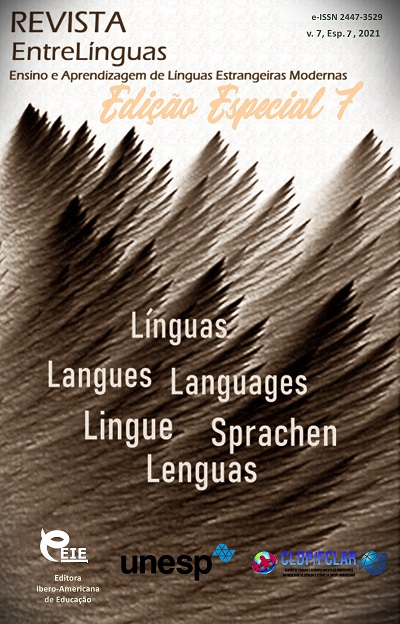The language system and its functioning in speech
DOI:
https://doi.org/10.29051/el.v7iesp.7.16310Keywords:
Language and speech, Meaning, Ambiguity, Cognitive linguisticsAbstract
In the prevailing era, the problem of studying the semantics of a lexical unit faces the totality of the complex “thinking – language system – speech,” implicating the multi-segment team of scientists. Hence, he present article attempt to provide sufficient proof for the non-reflective nature of language and speech. The linguistic observation, descriptive method, comparison as a universal linguistic method are utilized to meet the aim of the study. It has been demonstrated that a linguistic form, which, as a rule, is described by the dictionary as one having many figurative metaphorical meanings, is construed as unambiguous in the language system. New meanings emerge, are arranged by the speaker and the listener in the communication process, in the frame of an utterance. Therefore, polysemy can be viewed not as a word phenomenon in the language system but as a phenomenon of an utterance in speech.
Downloads
References
Arkhipov I. К. Communicative Zeitnot and Prototypical Semantics // Herald of Herzen Uni-versity № 4 (7). – SP.: RSPU, 2004. (in Russian)
Boikova I. B. The Sign Structure and Language Functionality // Proceedings of the 3rd Inter-national Workshop on Cognitive Linguistics. Part 2. – Tambov, 2002. [in Russian]
Buslaev F. I. Historical Grammar of the Russian Language. – М.: Science, 1959. [in Russian]
Gardiner A. Difference Between “Speech” and “Language” // V. А. Zvegintsev. The History of Linguistics of 20th-19th Centuries in Essays and Abstracts. P. 2. М.: Progress, 1965. [in Russian]
Grechko V. А. The Theory of Linguistics: Manual. – М.: Higher School, 2003. [in Russian]
Guillaume G. The Principles of Theoretical Linguistics. М.: Progress, 1992. [in Russian]
Humboldt W. Selecta on Linguistics. М: Progress, 2001. [in Russian]
Karamalak O., Pesina S. Linguistic sign and reading as text creating activity // Linguae Slov-enska Vzdelavacia a Obstaravacia s.r.o. Vol. 1 (2017), P. 2-14. DOI: 10.18355/XL.2017.10.01.01 ISSN: 1337-8384
Lomtev Т. P. General and Russian Linguistics. – М: Наука, 1976. [in Russian]
Lyons J. Introduction into Theoretical Linguistics – М.: Progress, 1978. [in Russian]
Lyons J. Language and Linguistics. Introductory Survey. – М: Editorial URSS, 2004. [in Russian]
Mednikova E. М. The Meaning of a Word and Methods of its Study. – М., 1974. [in Russian]
Paul H. Principles of the History of Language. – М.: Progress, 1960. [in Russian]
Pavlov V. М. Language Capacity of an Individual as an Object of Linguistic Science // The Theory of Speech Activity. – М., 1968. [in Russian]
Pesina S., Latushkina O. Polysemy and Cognition // Procedia - Social and Behavioral Scienc-es, Vol. 192, 24 (2015), P. 486 – 490.
Pesina S., Pulekha I., Tandon P., Functional Peculiar properties of Lexical Markers in the English Language, Gumanitarno-pedagogicheskie issledovaniya [Humanitarian and pedagogical Research], vol. 3, no 1, P.76 81. (2019) [in Russian]
Pesina S., Solonchak T. Word Functioning in Communication Process // Procedia - Social and Behavioral Sciences, Vol. 192, 24 (2015), P. 346 – 351.
Pesina S., Yusupova L. Words Functioning in Lexicon // Procedia - Social and Behavioral Sciences, Vol. 192, 24 (2015), P. 38 – 43.
Pesina S.A., Churilina L.N., Skvortsova M.L., Kozhushkova N.V., Baklykova T.Yu., Teren-tieva N.G. Functioning of polysemantic words in the lexicon // Applied Linguistics Research Journal. 2020. V. 4. № 9. P. 64-69. DOI: 10.14744/alrj.2020.24855
Pesina, S.A. Multi-level structure of polysemous word: Invariant-cluster analysis // Voprosy Kognitivnoy Lingvistikithis, 2021(1), PP. 60–69. DOI: 10.20916/1812-3228-2021-1-60-69, 2й квартиль, Импакт 0,922
Potebnya А. А. Notes from Russian Grammar. Vol. 1-2. М.: Science, 1959. [in Russian]
Saussure Ferdinand de. Course in General Linguistics. М.: Logos, 1998. [in Russian]
Solonchak T., Pesina S. Language Ability and Word Functioning // Procedia - Social and Be-havioral Sciences, Vol. 192, 24 (2015), P. 447 – 452.
Zvegintsev V. А. Language and Linguistic Theory. – М.: Editorial URSS, 2001. [in Russian]
Downloads
Published
How to Cite
Issue
Section
License

This work is licensed under a Creative Commons Attribution-NonCommercial-ShareAlike 4.0 International License.
Os manuscritos aceitos e publicados são de propriedade da Revista EntreLínguas. Os artigos publicados e as referências citadas na Revista EntreLínguas são de inteira responsabilidade de seus autores.
Transferência de direitos autorais – autorização para publicação
Caso o artigo submetido seja aprovado para publicação, já fica acordado que o(s) autor(es) autoriza(m) a UNESP a reproduzi-lo e publicá-lo na EntreLínguas, entendendo-se os termos “reprodução” e “publicação” conforme definição respectivamente dos incisos VI e I do artigo 5° da Lei 9610/98. O artigo poderá ser acessado pela rede mundial de computadores (Internet), sendo permitidas, a título gratuito, a consulta e a reprodução de exemplar do artigo para uso próprio de quem a consulta, desde que haja a citação ao texto consultado. Essa autorização de publicação 328 EntreLínguas, Araraquara, v. 1, n .2, p. 323-328, jul./dez. 2015 não tem limitação de tempo, ficando a UNESP responsável pela manutenção da identificação do(s) autor(es) do artigo. Os artigos publicados e as referências citadas na Revista EntreLínguas são de inteira responsabilidade de seus autores.











